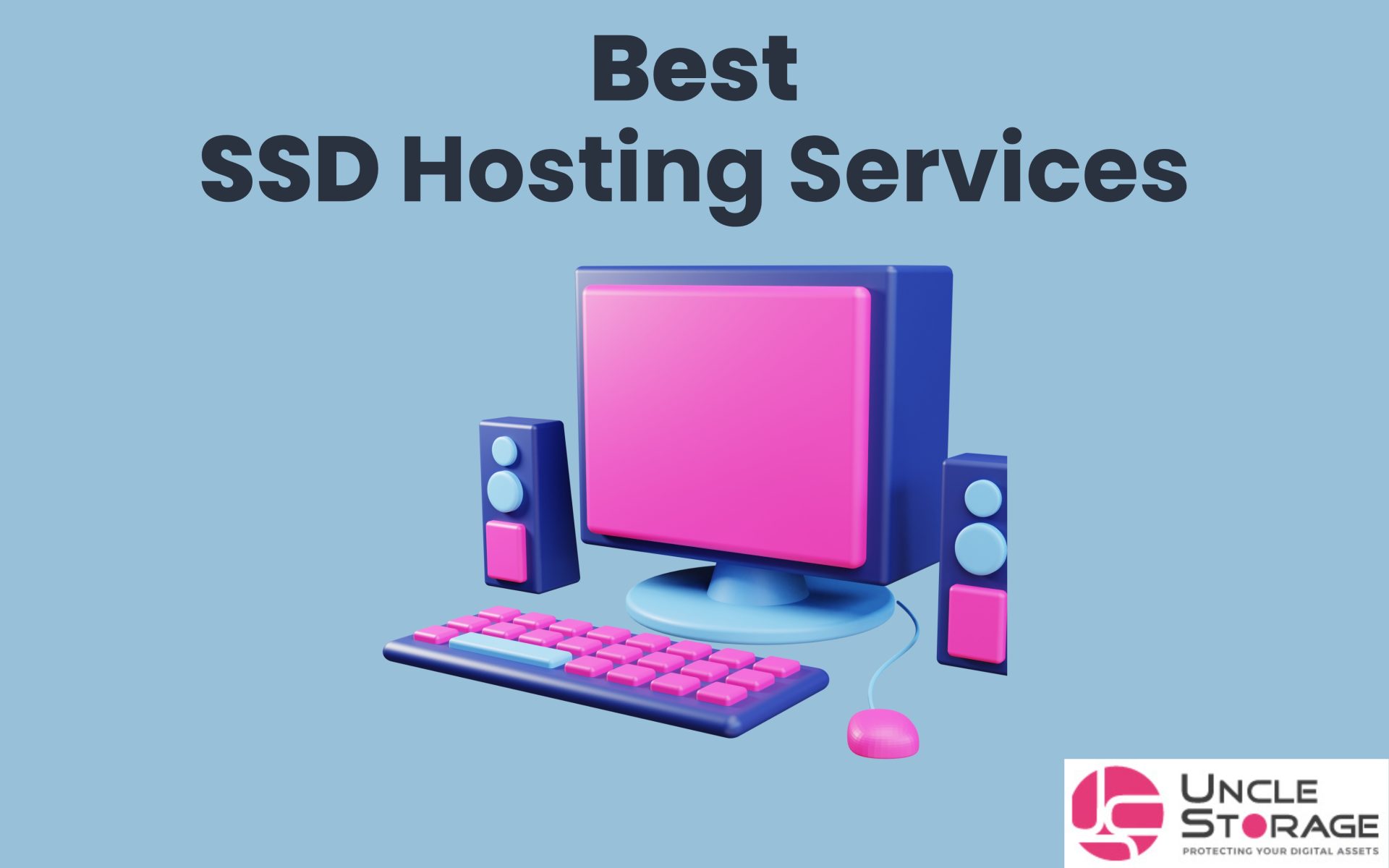
Top 10 SSD hosting providers 2024
1. QUAPE

QUAPE is well known for its affordable and high-quality hosting services. Their Business One web hosting plan is priced at just S$10.0. It includes a 15 GB SSD storage and 3 domains,unlimited Mysql database. QUAPE also guarantees excellent site speed.
What are the pros and cons of QUAPE’s SSD hosting?
There are 5 pros and 1 cons of using QUAPE’s SSD hosting:
Pros
- Generous SSD storage and multi-homed premium bandwidth
- Unlimited email accounts (Business Three plan)
- Ideal for beginners and WordPress websites
- 99.9% uptime guarantee and A+ server speed grade
- Extremely affordable pricing for premium hosting features
Cons
- Lowest rates require longer subscription periods
2. DreamHost

DreamHost was founded in 1997 and proudly hosts over 1.5 million websites, blogs, and online stores. Their Shared Unlimited plan costs only $2.95 per month and comes with unlimited SSD storage. They also have an impressive 100% uptime promise and offer a generous 97-day money-back guarantee.
What are the pros and cons of DreamHost’s SSD hosting?
There are 4 pros and 4 cons of using DreamHost’s SSD hosting:
Pros
- Unmetered bandwidth
- Automated daily free backups
- Unlimited email accounts
- Comes with free SSL
Cons
- Renewal price is $12.99
- Does not offer NVMe SSD
- No free domain name provided
- Only 2 data center locations
3. SiteGround

SiteGround is distinguished by its powerful infrastructure built on Google Cloud. Their StartUp plan is priced at $2.99 per month. It provides 10 GB SSD storage complemented by their powerful SuperCacher caching system. SiteGround also ensures consistent website performance with 11 data center locations globally.
What are the pros and cons of SiteGround’s SSD hosting?
There are 6 pros and 3 cons of using SiteGround’s SSD hosting:
Pros
- Unmetered bandwidth
- In-house Site Tools control panel
- Automated daily free backups
- Unlimited email accounts
- Comes with free SSL
- 30-day money back guarantee
Cons
- Renewal price is $17.99
- Does not offer NVMe SSD
- No free domain name provided
4. Bluehost

Bluehost stands as one of the three hosting providers officially recommended by WordPress.org. Their Choice Plus plan is priced at $5.45 per month. It offers 40 GB SSD storage, a free domain name, and complimentary SSL for enhanced security.
What are the pros and cons of Bluehost’s SSD hosting?
There are 3 pros and 6 cons of using Bluehost’s SSD hosting:
Pros
- Unmetered bandwidth
- Free daily backups
- 30-day money back guarantee
Cons
- 36-month subscription period
- Renewal price is $21.99
- Does not offer NVMe SSD
- No free email account provided
- Only 1 data center
- No uptime guarantee
5. HostPapa

HostPapa is a family-owned, independent hosting provider with a strong commitment to sustainability. Their Plus plan is priced at $4.76 per month. You get a spacious 100 GB SSD storage and the advanced LSI’s CacheCade Pro 2.0 for optimal site speed.
What are the pros and cons of HostPapa’s SSD hosting?
There are 4 pros and 2 cons of using HostPapa’s SSD hosting:
Pros
- Unmetered bandwidth
- Free domain name provided
- Comes with free SSL
- 30-day money back guarantee
Cons
- 36-month subscription period
- Does not offer NVMe SSD
6. GreenGeeks

GreenGeeks has been a leading eco-friendly web hosting provider since 2008. Their Pro plan costs $4.95 per month and offers unlimited SSD storage. The company also has a 300% energy match commitment, which means they give back three times the energy they use.
What are the pros and cons of GreenGeeks’s SSD hosting?
There are 5 pros and 2 cons of using GreenGeeks’s SSD hosting:
Pros
- Unmetered bandwidth
- Unlimited email accounts
- Free domain name provided
- Comes with free SSL
- 30-day money back guarantee
Cons
- Renewal price is $16.95
- Does not offer NVMe SSD
7. A2 Hosting

A2 Hosting was founded in 2001 and has made a name for itself with its fast and reliable hosting services. Their DRIVE plan is available for $4.99 per month with unlimited SSD storage. Their higher-tier shared plans offer NVMe for those seeking even faster performance.
What are the pros and cons of A2 Hosting’s SSD hosting?
There are 4 pros and 2 cons of using A2 Hosting’s SSD hosting:
Pros
- Automated daily free backups
- Unlimited email accounts
- Comes with free SSL
- 30-day money back guarantee
Cons
- Caching only available in higher tier shared plans
- No free domain name provided
8. InMotion Hosting

InMotion Hosting is widely recognized for its dependable hosting and strong customer support. Their Launch plan costs $4.99 per month. It includes unlimited NVMe storage and is enhanced by the UltraStack caching system. InMotion Hosting also has a 99.99% uptime guarantee and a generous 90-day money-back guarantee.
What are the pros and cons of InMotion Hosting’s SSD hosting?
There are 4 pros and 2 cons of using InMotion Hosting’s SSD hosting:
Pros
- Offers NVMe storage
- Unlimited email accounts
- Free domain name provided
- Comes with free SSL
Cons
- 36 month subscription period
- No free backups (paid feature)
9. ScalaHosting

ScalaHosting stands out for its proprietary control panel and cloud-based solutions. They emphasize web security. Their Start plan costs $5.95 per month and gives you 50 GB of fast SSD NVMe storage. They also back their services with an anytime money-back guarantee.
What are the pros and cons of ScalaHosting’s SSD hosting?
There are 6 pros and 2 cons of using ScalaHosting’s SSD hosting:
Pros
- Offers NVMe storage
- Unmetered bandwidth
- Automated daily backups
- Unlimited email accounts
- Free domain name provided
- Comes with free SSL
Cons
- 36 month subscription period
- Caching only available in VPS and higher plans
10. GoDaddy Hosting

GoDaddy Hosting is one of the biggest names in the domain registration and hosting industry. Their Economy plan is priced at $5.99 per month. It provides 25 GB of SSD NVMe storage and enhanced performance with PHP OPCache caching.
What are the pros and cons of GoDaddy Hosting’s SSD hosting?
There are 6 pros and 2 cons of using GoDaddy Hosting’s SSD hosting:
Pros
- Offers NVMe storage
- Unmetered bandwidth
- Automated daily backups
- Free domain name provided
- Comes with free SSL
- 30-day money back guarantee
Cons
- 36 month subscription period
- No free email account provided
What Is SSD Hosting?
SSD hosting is a type of web hosting service that utilizes solid state drives (SSD) for storage or disk space purposes. This is different from traditional hosting which relies on hard disk drives (HDD). In SSD hosting, all your website’s files, data, and databases are stored on SSDs.
What is a Solid State Drive?
A solid state drive (SSD) is a storage device that uses NAND flash memory to store and access data digitally. There are two main types of SSDs and these are SATA and NVMe. An SSD operates without any moving components. This is unlike the traditional hard disk drive (HDD) which uses moving parts to read and write data. This lack of mechanical parts means SSDs work faster and more efficiently than HDDs. It offers users a noticeable boost in speed and reliability.
How much faster is SSD compared to HDD?
An SSD reads and writes data 4x to 70x faster than an HDD. An HDD has a read and write speed of 150 MBps, while a SATA SSD can read and write at 550 MBps. NVMe SSDs can go up to 10,000 MBps.
What Can I Expect From SSD Hosting?
You can expect four benefits from SSD hosting:
- Increased speed
SSDs use flash memory, which means they can process more read and write requests at once. This allows websites to load faster. - Improved reliability
SSDs have no moving parts, unlike HDDs that have spinning disks and arms. This makes SSDs less likely to break down. Users can enjoy more consistent uptime as a result. - Power and energy efficiency
SSDs use less power, produce less heat, and need less cooling. This translates to a lower cost for hosting services that use SSDs. - Faster recovery time
Data on SSDs can be recovered more easily than on HDDs. This lessens downtime since any issues can be fixed more quickly.
What Are The Limitation Of SSD Hosting?
There are three limitations of SSD hosting:
- Higher cost
SSD hosting plans are 1.5x to 3x more expensive than HDD hosting plans for the same amount of storage. - Less capacity
You get less storage capacity with an SSD than you would with an HDD for the same price. - Shorter lifespan
An SSD’s chips wear out a little every time data is written into it. Over time these chips will fail and not store data anymore. Therefore, SSDs tend to wear out faster than HDDs, especially with frequent data changes.
What Are The Popular Types Of SSD Hosting?
The most popular types of hosting that utilize SSDs include WordPress hosting, cloud hosting, and Virtual Private Server (VPS) hosting. The specific storage capacity offered with SSDs differs from one hosting provider to another.
What is SSD WordPress hosting?
SSD WordPress hosting is a type of hosting specifically designed for WordPress sites and blogs that use solid state drives (SSD) for storage. This means the files, data, and databases of the WordPress content management system (CMS) are stored on SSDs. The hosting plan is optimized or managed to ensure that WordPress sites run efficiently and at peak performance.
What is SSD cloud hosting?
SSD cloud hosting is a hosting solution where websites reside on dedicated SSD storage. This storage is virtualized from multiple physical servers. It’s not bound to a single server. This means resources can be adjusted as needed and this saves users from paying for more than they use. SSD cloud hosting is suitable for websites needing superior speed performance and also increased resource scalability for fluctuating traffic.
What is SSD VPS hosting?
SSD VPS hosting is a type of hosting where websites get their own specific SSD storage allocations. This storage is virtualized from one physical server. It’s important to note that its scalability in resources has a cap as it’s limited by the capacity of the physical server itself. SSD VPS hosting is ideal for websites experiencing growing traffic.
What Is Cheap SSD Hosting?
Cheap SSD hosting is a type of web hosting that offers SSD or NVMe storage at affordable rates below $5 per month. These plans come packed with features such as unlimited SSD or NVMe storage, unmetered bandwidth, and daily backups at no extra charge. They also usually include perks such as a free Content Delivery Network (CDN), free SSL certificate. They even include a complimentary domain name.
Does SSD Hosting Capacity Affect Website Performance?
Yes, SSD hosting capacity does affect website performance. An SSD with a larger capacity takes more time to be fully occupied with website files and data, which delays the performance decay. This keeps your website running quickly for longer. An SSD that is consistently full or near its capacity wears out and slows down more rapidly. This is caused by the decay in the cells of the flash memory chip in the SSD, which occurs from repeated write and rewrite cycles.
What Is NVMe Hosting?
NVMe hosting is a type of web hosting that uses SSDs with the Non-Volatile Memory Express (NVMe) protocol for storage. This protocol uses the PCIe interface and this offers higher bandwidth for increased data transfer rates. NVMe SSDs can therefore transfer data much faster than traditional SATA SSDs. Read our best NVMe hosting shortlist for our brand recommendations.
Which Is The Best SSD Web Hosting?
he best SSD web hosting provides fast website speeds and excellent uptime using SSD technology. These hosts give great performance and offer well-rounded features at a budget-friendly price.

